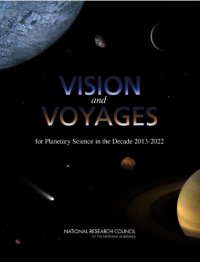
Ebook: Vision and voyages for planetary science in the decade 2013-2022
- Genre: Technique // Transportation: Aviation
- Tags: Транспорт, Аэрокосмическая техника
- Year: 2011
- Publisher: National Academies Press
- City: Outer space, Washington, D.C., Outer space
- Edition: Pap/Cdr
- Language: English
- pdf
In recent years, planetary science has seen a tremendous growth in new knowledge. Deposits of water ice exist at the Moon's poles. Discoveries on the surface of Mars point to an early warm wet climate, and perhaps conditions under which life could have emerged. Liquid methane rain falls on Saturn's moon Titan, creating rivers, lakes, and geologic landscapes with uncanny resemblances to Earth's.
Vision and Voyages for Planetary Science in the Decade 2013-2022 surveys the current state of knowledge of the solar system and recommends a suite of planetary science flagship missions for the decade 2013-2022 that could provide a steady stream of important new discoveries about the solar system. Research priorities defined in the report were selected through a rigorous review that included input from five expert panels. NASA's highest priority large mission should be the Mars Astrobiology Explorer Cacher (MAX-C), a mission to Mars that could help determine whether the planet ever supported life and could also help answer questions about its geologic and climatic history. Other projects should include a mission to Jupiter's icy moon Europa and its subsurface ocean, and the Uranus Orbiter and Probe mission to investigate that planet's interior structure, atmosphere, and composition. For medium-size missions, Vision and Voyages for Planetary Science in the Decade 2013-2022 recommends that NASA select two new missions to be included in its New Frontiers program, which explores the solar system with frequent, mid-size spacecraft missions. If NASA cannot stay within budget for any of these proposed flagship projects, it should focus on smaller, less expensive missions first.
Vision and Voyages for Planetary Science in the Decade 2013-2022 suggests that the National Science Foundation expand its funding for existing laboratories and establish new facilities as needed. It also recommends that the program enlist the participation of international partners. This report is a vital resource for government agencies supporting space science, the planetary science community, and the public.